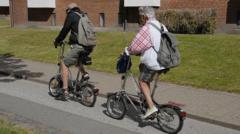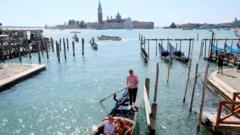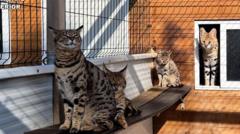As the Marineland Antibes facility remains closed, the plight of orcas Wikie and her son Keijo grows more critical. With the French government and animal rights organizations unable to agree on rehoming solutions, trainers have resorted to sexual stimulation of Keijo to prevent inbreeding, amid ethical concerns over the captivity of these intelligent creatures.
Orcas in Crisis: Unusual Measures Taken to Prevent Inbreeding at Marineland

Orcas in Crisis: Unusual Measures Taken to Prevent Inbreeding at Marineland
In a troubling situation, a male killer whale at a closed French zoo is being sexually stimulated to prevent inbreeding, as rehoming efforts for him and his mother stall.
In a shocking revelation, a male killer whale at the shuttered Marineland Antibes in southern France is undergoing sexual stimulation by his trainers to curb inbreeding with his mother. The situation arises as the marine park faces closure due to a new French law, enforcing a ban on the use of whales in marine shows starting December. The orcas, 24-year-old Wikie and her 11-year-old son Keijo, are still confined to their pools, receiving care from their trainers while no agreement has been reached regarding their relocation.
Activists from the group TideBreakers recently uncovered footage depicting trainers stimulating Keijo, who was seen lying on his back while being attended to by two trainers. The footage illustrated the challenges of keeping the mother and son together in captivity, as orcas are known for their social nature. The trainers explained to BBC News that this measure was critical as Keijo approaches adolescence, developing strong sexual urges they felt needed to be managed to avoid tension and potential conflict between him and Wikie.
The actions taken by Marineland have sparked significant concern among animal rights advocates. Valerie Greene, a former killer whale trainer, described the approach as unprecedented and expressed anxiety over the ramifications of potentially using Keijo’s semen for breeding purposes, noting the risks associated with his inbreeding—both of his parents are half-siblings.
Despite Marineland's insistence that the stimulation is not for semen collection, critics regard the situation as part of a broader moral decline in the captive marine industry. They argue that the priority should be finding a safer environment for the orcas rather than implementing methods that reflect poorly on animal welfare practices.
As the search for a permanent home for Wikie and Keijo drags on, discussions surrounding potential sanctuary options remain stagnant. The French Ecology Ministry has been involved but has yet to announce a viable plan for the orcas’ relocation, leading advocates to question the commitment to their welfare. The current circumstances illustrate a dire situation for these marine mammals, raising many ethical and emotional questions about captivity and the responsibility of zoos towards their charges.
TideBreakers, along with other advocacy groups, continues to call for urgent solutions, emphasizing that the well-being of Wikie and Keijo should not be overlooked as discussions about their future continue. As the countdown to the law's enactment advances, the time to act for their future may be running short.





















